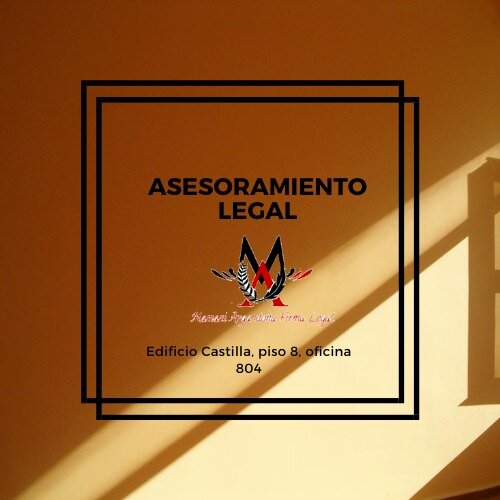Best Tax Lawyers in La Paz
Share your needs with us, get contacted by law firms.
Free. Takes 2 min.
List of the best lawyers in La Paz, Bolivia
About Tax Law in La Paz, Bolivia
Tax law in La Paz, Bolivia encompasses the regulations and rules concerning the assessment and collection of taxes. It governs the taxation of individuals, businesses, and other entities within La Paz. Taxes in Bolivia are imposed by both the national and local governments, with various types of taxes that may apply.
Why You May Need a Lawyer
There are several situations where you may need a lawyer specializing in tax law in La Paz, Bolivia:
- If you are starting a business and need assistance with tax registrations and compliance
- If you have received a notice or audit from the tax authorities and require representation
- If you are involved in a tax dispute or litigation
- If you need advice on tax planning and strategies to minimize your tax obligations
- If you are seeking guidance on international tax matters
Local Laws Overview
When it comes to tax in La Paz, Bolivia, several key aspects of local laws are particularly relevant:
- The Bolivian Tax Code outlines the different types of taxes applicable in the country
- Income tax is levied on both individuals and businesses based on their earnings
- Value Added Tax (VAT) is imposed on the sale of goods and services
- There are special tax regimes for certain industries or activities, such as mining or hydrocarbon exploration
- Taxpayers are required to keep proper records and submit periodic tax returns
Frequently Asked Questions
Q: How do I register for tax in La Paz, Bolivia?
A: To register for tax in La Paz, Bolivia, you need to fill out the necessary forms and provide the required documents to the tax authorities. It is advisable to seek assistance from a lawyer or a tax professional to ensure compliance with the registration process.
Q: What are the tax rates for individuals in La Paz, Bolivia?
A: The tax rates for individuals in La Paz, Bolivia vary depending on their income level. The rates range from 13% to 27% of the taxable income. It is essential to consult the current tax laws or seek advice from a tax lawyer for accurate and up-to-date information.
Q: Can I appeal a tax assessment or penalty in La Paz, Bolivia?
A: Yes, you have the right to appeal a tax assessment or penalty in La Paz, Bolivia. It is recommended to engage a tax lawyer to guide you through the appeals process and present your case effectively.
Q: Are there any tax incentives or exemptions available in La Paz, Bolivia?
A: Yes, several tax incentives and exemptions are available in La Paz, Bolivia. These may vary depending on the industry or specific activities. Consulting with a tax lawyer can help you identify and take advantage of any applicable tax incentives or exemptions.
Q: What are the consequences of tax evasion in La Paz, Bolivia?
A: Tax evasion in La Paz, Bolivia is a serious offense. It can result in penalties, fines, and even criminal charges. It is strongly advised to comply with tax laws and seek legal advice to ensure proper tax planning and compliance.
Additional Resources
Here are some resources, governmental bodies, and organizations related to tax in La Paz, Bolivia, that can be helpful for someone in need of legal advice:
- Internal Revenue Service of Bolivia - www.taxauthority.bo
- Bolivian Chamber of Commerce - www.bolchamber.com
- Bolivian Tax Lawyers Association - www.taxlawyersbo.org
Next Steps
If you require legal assistance in tax matters in La Paz, Bolivia, here are the next steps to consider:
- Assess your specific tax needs and determine the type of legal assistance required
- Research and identify reputable tax lawyers or law firms with expertise in La Paz, Bolivia tax law
- Contact the selected lawyer or law firm to schedule an initial consultation
- Prepare relevant documents and information for the consultation to discuss your case
- Collaborate with your chosen lawyer to develop a strategy and proceed with the necessary legal actions
Lawzana helps you find the best lawyers and law firms in La Paz through a curated and pre-screened list of qualified legal professionals. Our platform offers rankings and detailed profiles of attorneys and law firms, allowing you to compare based on practice areas, including Tax, experience, and client feedback.
Each profile includes a description of the firm's areas of practice, client reviews, team members and partners, year of establishment, spoken languages, office locations, contact information, social media presence, and any published articles or resources. Most firms on our platform speak English and are experienced in both local and international legal matters.
Get a quote from top-rated law firms in La Paz, Bolivia — quickly, securely, and without unnecessary hassle.
Disclaimer:
The information provided on this page is for general informational purposes only and does not constitute legal advice. While we strive to ensure the accuracy and relevance of the content, legal information may change over time, and interpretations of the law can vary. You should always consult with a qualified legal professional for advice specific to your situation.
We disclaim all liability for actions taken or not taken based on the content of this page. If you believe any information is incorrect or outdated, please contact us, and we will review and update it where appropriate.









